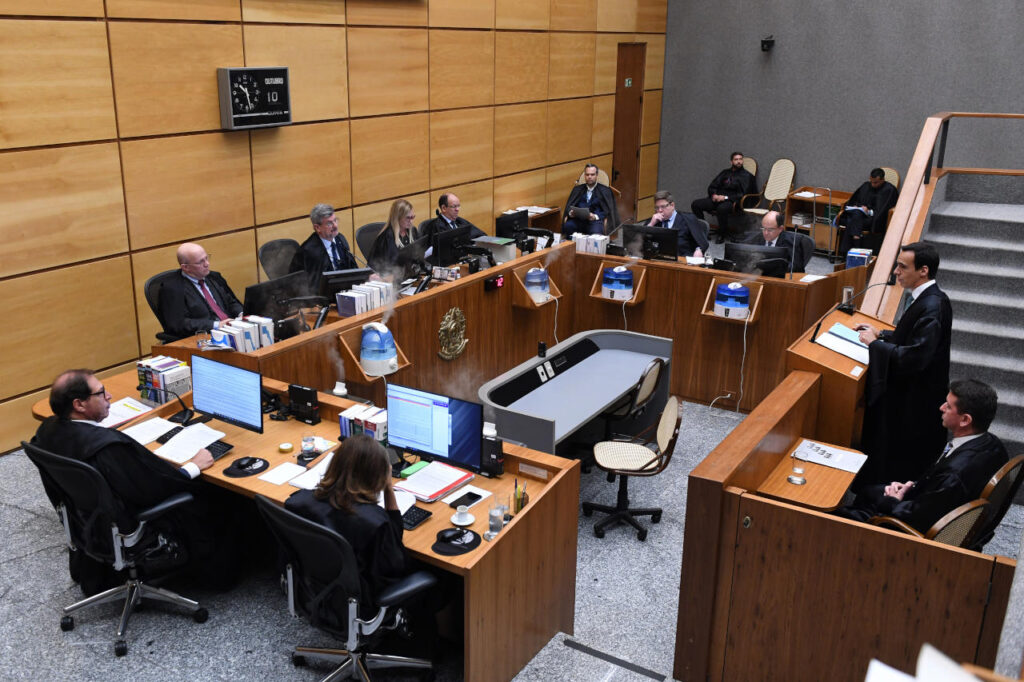Updated at 9:16 p.m. 01/06/2021
The Third Section of the Superior Court of Justice (STJ) reaffirmed the understanding that the nullity resulting from the reversal of the order of interrogation – provided for in the article 400 of the Code of Criminal Procedure (CPP) – is relative, subject to preclusion and demands the demonstration of the damage suffered by the defendant.
The collegiate denied the request for criminal review of the judgment of the Sixth Panel that, for not observing any nullity, kept in 12 years of imprisonment the conviction of a defendant accused of sexual abuse against his nine-year-old niece.
For the defense, there was absolute nullity in the conviction, since the defendant was questioned before the victim and the prosecution witnesses.
STF
The rapporteur, Minister Reynaldo Soares da Fonseca, pointed out that the STJ, following the understanding of the plenary of the Federal Supreme Court (STF) in the judgment of the HC 127.900, established that the procedural rite for interrogation, provided for in article 400 of the CPP, it must be applied to all procedures governed by special laws.
According to the magistrate, the Fifth Panel of the STJ has precedents in the sense that, to recognize nullity by reversing the order of interrogation, “It is necessary that the defense's nonconformity has been manifested in a timely manner, That is, at the very hearing in which the act was carried out, under penalty of preclusion. In addition, It is necessary to prove the damage that the defendant would have suffered with the aforementioned inversion”.
Nevertheless, he recalled that the Sixth Panel has already taken a position in favor of the need to demonstrate the damage resulting from the reversal of the order of the defendant's interrogation, in a case in which he was convicted, since the conviction would already correspond to the damage. In the same judgment, The Justices considered that, because it is an implicit loss (or presumed), there would be no preclusion for the argument of nullity regarding the non-observance of article 400 of the CPP.
Independent evidence
According to Reynaldo Soares da Fonseca, The completion of the interrogation before the hearing of witnesses and the victim deprives the accused of access to information, since it will manifest itself before the production of an important portion of the evidence. “The reversal of the interrogation, so, promotes a clear weakening of the constitutional principles of adversarial and full defense – undue, In my view, in the context of criminal prosecution”, Declared.
In the magistrate's assessment, but, The damage resulting from the reversal of the order of the defendant's interrogation cannot be considered presumed, only by virtue of the supervenience of a conviction. For him, it is necessary to verify, at the very least, whether the conviction was supported by independent evidence, suitable and sufficient to determine the authorship and materiality of the crime, even if the testimonies of the witnesses are disregarded, “for there is no use in setting aside a judgment which, anyway, would be maintained on other independent grounds”.
The rapporteur also stated that the argument of the unnecessity of arguing the procedural defect in the instruction and trial hearing “transmutes relative nullity into absolute nullity, this one that can be recognized and declared, even ex officio, at any level of jurisdiction and that does not admit the validation or repetition of the procedural act”. However, The minister recalled that, to the jurisprudence of the STF, The reversal in the order of the defendant's interrogation constitutes relative nullity and subject to preclusion.
In the case under review, Reynaldo Soares da Fonseca found that the judgment submitted to criminal review does not differ from the jurisprudence, because it understood that the issue related to procedural nullity would be precluded, since it was not alleged by the defense in a timely manner at the very hearing in which the interrogation took place, but only in motions for clarification on appeal; In addition, there was no demonstration of actual damage to the defendant.
Divergence
By disagreeing with the rapporteur, Minister Rogerio Schietti Cruz recalled that the Law 11.719/2008 – edited four years before the interrogation under discussion – changed the procedures and made it clear that the accused must be questioned last. He stated that the interrogation is, essentially, An act of self-defense, But the defendant was not given the opportunity to manifest himself, at the end of the instruction, on the facts pointed out by the witnesses or on the prosecution's evidence – with which it could have influenced the formation of the judge's conviction.
“There is no way to impute to the defendant's defense the burden of proving possible damage as a result of an illegality for which he did not give cause and in a process that has already resulted in his own conviction. This is because there is no, in criminal proceedings, greater harm than a conviction resulting from a procedure that did not respect legal guidelines”, added the minister.
The number of this case is not disclosed due to judicial secrecy.
Source: https://www.stj.jus.br/sites/portalp/Paginas/Comunicacao/Noticias/01062021-Nulidade-do-interrogatorio-por-inversao-da-ordem-e-relativa-e-exige-prova-de-prejuizo-para-o-reu.aspx

